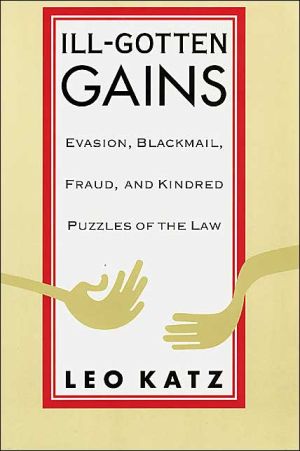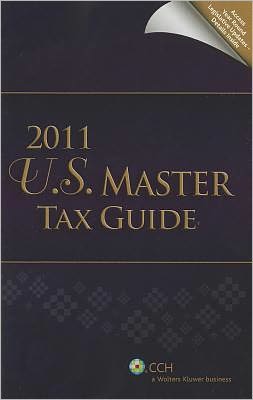Ill-Gotten Gains: Evasion, Blackmail, Fraud, and Kindred Puzzles of the Law
The law is full of schemes that use subterfuge and circumvention. Clients routinely ask their lawyers to help them find a legal way around the law; and lawyers routinely oblige them, saying things like: "You would like to make a movie with lots of steamy sex and not run the risk of an obscenity suit? Well, why don't you load it up with some important social message, and that way it no longer qualifies as obscene!" Or: "You would like to reduce your taxes? Well, why don't you consider the...
Search in google:
In Ill-Gotten Gains, Leo Katz describes the underlying principles that not only guide the law but also moral decisions. Mixing wit with insight, anecdotes with analysis, Katz uncovers what is really at stake in crimes such as insider trading, blackmail, and plagiarism. With its startling conclusions and myriad twists, this book will fascinate all those intrigued by the perplexing relationship between morality and law."An ambitious and well-written book of legal and moral theory to overthrow both utilitarianism and its cousin, the economic approach to law."—Richard A. Posner, New Republic"A good, well-written book full of interesting examples."—Library Journal"[An] elegant defense of circumvention and subterfuge . . . a heroically counterintuitive book."—Malcolm Gladwell, New Yorker Kirkus Reviews What's law got to do with it? A law professor muses about the legal rules governing morally ambiguous cases of misappropriation such as tax evasion and insider trading.Katz (Univ. of Pennsylvania) has set himself quite a task: to solve the "mystery" of marginal instances of theft, cases in which the law and common practice diverge. He begins by deconstructing what he dubs "avoision," those acts and omissions "hovering in the limbo between legitimate avoidance and illegitimate evasion" of the criminal law. For example, he asks, is there anything morally wrong with "gift-leaseback" maneuvers to circumvent tax laws? With corporations that insulate themselves from liability by incorporating subsidiaries to perform environmentally hazardous work? Should the law treat such acts as crimes? Katz says no. Alluding to myriad instances of "avoision" in the Talmudic and Jesuitic traditions, as well as in history and literature, he shows how "avoision" is an inherent part of any formal system of morality, which the law merely mirrors. Therefore, he argues, when lawyers strategize to circumvent legal rules, they are merely capitalizing on the formalistic properties of the law, like latter-day Talmudists and Jesuits. Lest readers fear that Katz is leading them down devilishly slippery slopes, he returns in Part II with an attack on blackmail, arguing that the blackmailer may not evade the criminal code by deeming the transaction a standard "offer." An obvious point belabored, but the comparison between blackmail and insider trading is opaque, cluttered with "optional red herrings" and endless too-cute hypotheticals. The final chapter on the "misappropriation of glory" (e.g., stealing intellectual property) is similarly meandering and pedantic, at a remove from the laws that judges and lawyers actually apply. Academics may be captivated by the interdisciplinary approach, but lawyers and general readers will bail out early on.
Unsolved Crimes: An Introduction Part One - Avoidance and Evasion The Problem The Problem Multiplied Bogus Solutions Loopholes without Laws Loopholes and the Theologians Could the Hairsplitters Be Right? The Heart, the Lungs, and the Kidneys of the Matter An Analogy: Legislation A Further Analogy: Litigation The Importance of Pedigree Implications and Applications: Tax Law and Related Problems Implications and Applications: Corporate Law and Related Problems Further Implications and Applications: Cracking the Test, Beating the System, Avoiding the Ticket, and Other Deontological Tricks of Everyday Life From Restructuring to Reframing The Consequentialist Frame-Up Indeterminacy and Doubt The Short Answer Part Two - Blackmail and Other Criminal Bargains The Problem Blackmail in Relation to "Plain Vanilla" Coercion Other People's Thoughts A Puzzle about Punishment The Punishment Puzzle Resolved Blackmail ProperAn Objection: The Kreplach Problem Another Blackmail Paradox The Insider Trading Puzzle A Red (But Not Unsavory) Herring: Ignorance and Incommensurability Another Red Herring: The Hidden Victims of Insider Trading The Real Problem with Insider Trading: First Version of the Argument The Real Problem with Insider Trading: Second Version of the Argument Blackmail, Insider Trading, and Amartya Sen's Libertarian Paradox The Short Answer Part Three - The Misappropriation of Glory The Problem The Actus Reus of Doing Good The Mens Rea of Doing Good Causing GoodAssisting with the Good Attempting the Good Defenses and Detractions Some Questions of Procedure The Value of a Thing The Short Answer Denouement Acknowledgments Notes Index
\ Kirkus ReviewsWhat's law got to do with it? A law professor muses about the legal rules governing morally ambiguous cases of misappropriation such as tax evasion and insider trading.\ Katz (Univ. of Pennsylvania) has set himself quite a task: to solve the "mystery" of marginal instances of theft, cases in which the law and common practice diverge. He begins by deconstructing what he dubs "avoision," those acts and omissions "hovering in the limbo between legitimate avoidance and illegitimate evasion" of the criminal law. For example, he asks, is there anything morally wrong with "gift-leaseback" maneuvers to circumvent tax laws? With corporations that insulate themselves from liability by incorporating subsidiaries to perform environmentally hazardous work? Should the law treat such acts as crimes? Katz says no. Alluding to myriad instances of "avoision" in the Talmudic and Jesuitic traditions, as well as in history and literature, he shows how "avoision" is an inherent part of any formal system of morality, which the law merely mirrors. Therefore, he argues, when lawyers strategize to circumvent legal rules, they are merely capitalizing on the formalistic properties of the law, like latter-day Talmudists and Jesuits. Lest readers fear that Katz is leading them down devilishly slippery slopes, he returns in Part II with an attack on blackmail, arguing that the blackmailer may not evade the criminal code by deeming the transaction a standard "offer." An obvious point belabored, but the comparison between blackmail and insider trading is opaque, cluttered with "optional red herrings" and endless too-cute hypotheticals. The final chapter on the "misappropriation of glory" (e.g., stealing intellectual property) is similarly meandering and pedantic, at a remove from the laws that judges and lawyers actually apply.\ Academics may be captivated by the interdisciplinary approach, but lawyers and general readers will bail out early on.\ \ \








